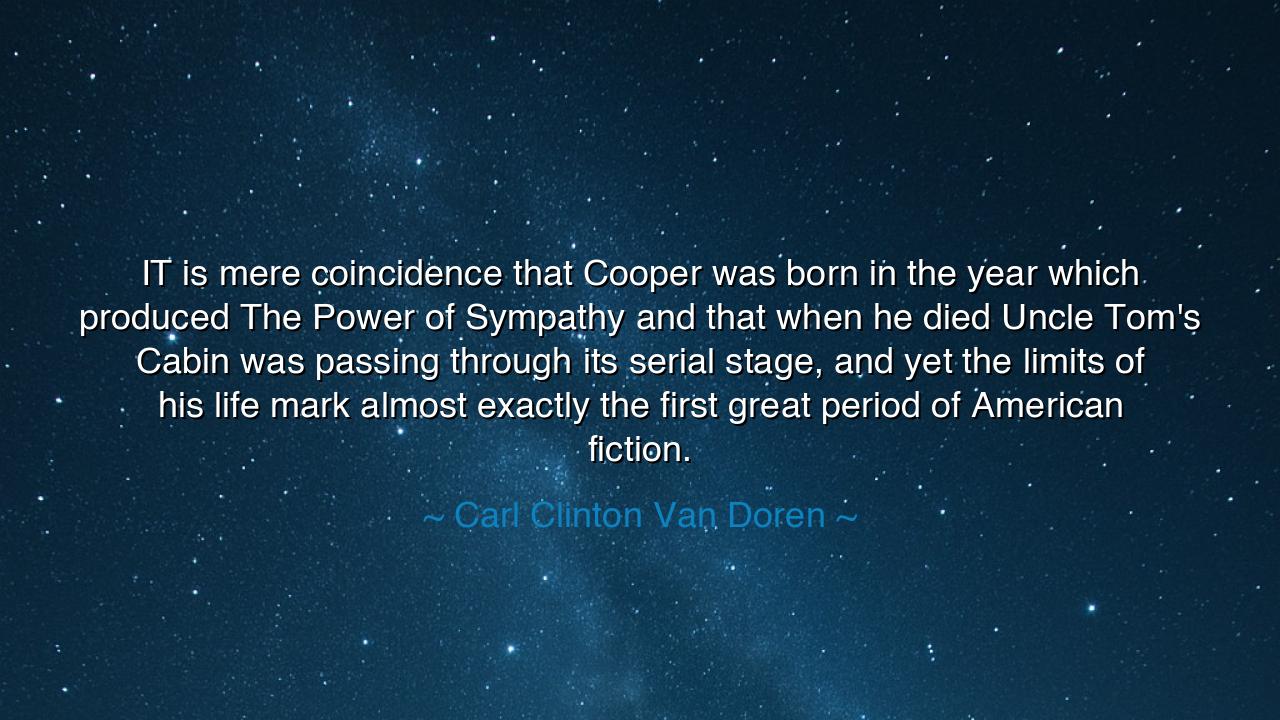
IT is mere coincidence that Cooper was born in the year which
IT is mere coincidence that Cooper was born in the year which produced The Power of Sympathy and that when he died Uncle Tom's Cabin was passing through its serial stage, and yet the limits of his life mark almost exactly the first great period of American fiction.






Hear, then, the words of Carl Clinton Van Doren, who wrote with the vision of a historian and the soul of a sage: “It is mere coincidence that Cooper was born in the year which produced The Power of Sympathy and that when he died Uncle Tom’s Cabin was passing through its serial stage, and yet the limits of his life mark almost exactly the first great period of American fiction.” In this statement lies not only the remembrance of one man, but the story of a nation’s awakening voice. For Van Doren reminds us that the life of James Fenimore Cooper, though measured in mortal years, stretched across the first mighty arc of America’s literary dawn.
The meaning of this utterance is clear: Cooper’s birth in 1789, the year when The Power of Sympathy—the first American novel—was published, stands as the symbolic opening of an age. And when Cooper’s life ended in 1851, the serialized pages of Uncle Tom’s Cabin were stirring hearts across the land, shaking the conscience of a people bound in the chains of slavery. Thus, though Van Doren calls it coincidence, it is a coincidence rich with destiny: Cooper’s lifetime is a frame within which the first great period of American fiction was written, a time when a young nation sought its voice and found it in the ink of its storytellers.
Consider the figure of James Fenimore Cooper himself, the author of The Last of the Mohicans, who first gave the American wilderness a mythic voice. He wrote not of palaces and courts, but of frontiers and forests, of men and women caught between civilization and the wild. His tales carried the echo of muskets, the silence of rivers, and the clash of cultures. He carved into the hearts of readers the sense that America was not merely a colony of Europe, but a land with stories of its own. In this way, he stood as a prophet of literature, showing that a people’s spirit can be told in the sagas of hunters, pioneers, and nations unborn.
And when Harriet Beecher Stowe’s Uncle Tom’s Cabin arose, it revealed another face of American fiction—no longer the romance of wilderness, but the moral cry of a people against injustice. While Cooper gave myth to the frontier, Stowe gave voice to the enslaved. Together, these bookends of Cooper’s life—The Power of Sympathy at his birth and Uncle Tom’s Cabin at his death—mark the passage from the uncertain beginnings of fiction to the moment when literature became a force that could stir the conscience of millions.
Such is the wisdom of Van Doren’s insight: literature is not bound merely to words upon a page, but to the destiny of nations. The period of Cooper’s life marks more than personal achievement; it defines an era in which America learned to speak through story, to imagine itself, to test its conscience, and to proclaim its soul to the world. This is why his life becomes a symbol, a living measure of time, as though Providence itself ordained that the span of one man would reflect the span of a nation’s first flowering in art.
The lesson for us is plain: every age has its voices, every generation its prophets of word and spirit. We too live in such a time, when our own stories are being written, and future generations will mark the boundaries of our years as the limits of some new era. Let none despise their voice, nor doubt their power to contribute to the chorus of their people. The pen, wielded with truth, may stand as tall as the sword in shaping the destiny of nations.
Therefore, let each who hears these words take practical action: read the voices of your land, honor the storytellers of your time, and do not shrink from writing your own story, however humble. For you cannot know how your life, when measured by history, may come to define the age in which you live. Just as Cooper’s years came to embody the first great period of American fiction, so too might your voice, your courage, your work, stand as a marker for those who come after.
So let it be remembered: coincidence may frame the years, but destiny fills them. The life of Cooper, bound between The Power of Sympathy and Uncle Tom’s Cabin, teaches us that in the span of a single lifetime, a people can discover its voice, its conscience, and its power. May we too live so that our years, when measured, will be found worthy of remembrance.






AAdministratorAdministrator
Welcome, honored guests. Please leave a comment, we will respond soon